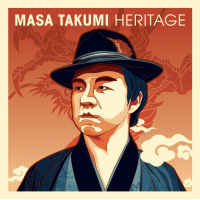Home » Jazz Articles » Album Review » Masa Takumi: Heritage
Masa Takumi: Heritage
On Takumi's 2016 solo debut Stars Falling, he composed and performed all the instruments, a sparkling orchestral dreamscape. This was followed in 2017 by the album Deep Down, which won both Akademia Music Awards and Global Music Awards. His artistic music video for Deep Down achieved a nomination at the 2018 Hollywood Music In Media Awards. Takumi is also an accomplished magician and a member of the world-famous Magic Castle, an exclusive, private club in Hollywood, California.
The title track, "Heritage" (3:30), opens with a bouncing boogie done in a gakaku style, which soon breaks into an icy cold bridge, then takes it back to the bounce. Decorated with traditional spooky instrument sounds, there is that funky beat. Dig the thematic transformation, with lots of popping around old school imperial court music mixing with the drums and the piano, one can feel his music bringing the past to life in a symphonic way.
"Sakura River" (3:36) is a refreshing slow meditation on cherry blossoms shimmering on the peaceful water. During the piano solo one might think of a haiku poem describing both arboreal and human "blossoms." The joyful tradition of hanami (flower viewing) is an old and ongoing tradition, a reverential, sacred respect bringing to mind both clouds and cloud-like profusions of springtime sakura blossoms, on a glorious spring day, with watery reflections, to remind us how the world should be. World peace is the basic message.
To close, the album returns to the stately imperial sound drifting on a bed of piano poetry. "Midwater Night's Neo Dream" (3:34), bringing back the full blended orchestra with Kabuki shadows and flowing grooves, long, sustained, and very slow in feeling but lifted into heavenly dance; the effect is complex and haunting.
Track Listing
Heritage; Hanamachi Girl; After The Nightmare; Bells In Summer; Toki; Bamboo Forest; Sakura River; Midwater Night's Neo Dream.
Personnel
Additional Instrumentation
Masa Takumi: Piano, Drums, Guitar, Bass, Shamisen
Album information
Title: Heritage | Year Released: 2020 | Record Label: Domo Records
< Previous
Recognition
Comments
About Masa Takumi
Instrument: Multi-instrumentalist
Related Articles | Concerts | Albums | Photos | Similar ToTags
For the Love of Jazz
 All About Jazz has been a pillar of jazz since 1995, championing it as an art form and, more importantly, supporting the musicians who create it. Our enduring commitment has made "AAJ" one of the most culturally important websites of its kind, read by hundreds of thousands of fans, musicians and industry figures every month.
All About Jazz has been a pillar of jazz since 1995, championing it as an art form and, more importantly, supporting the musicians who create it. Our enduring commitment has made "AAJ" one of the most culturally important websites of its kind, read by hundreds of thousands of fans, musicians and industry figures every month.



















